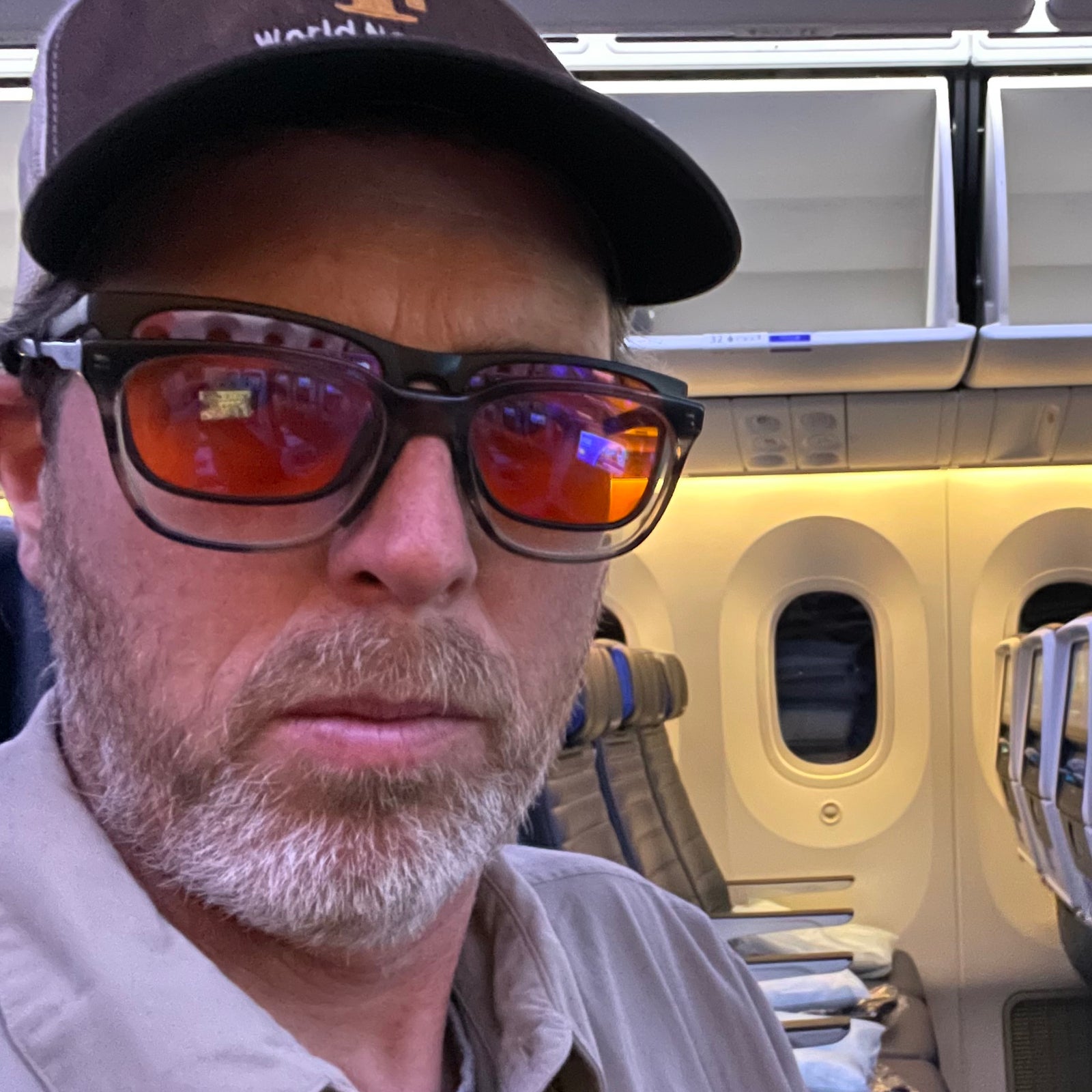I should be wrecked.
It’s my first full day in South Africa after a brutal 33-hour journey from my home in Bend, Oregon. I woke at 3:15 A.M. to catch the first of three flights to Johannesburg, crossed nine time zones in economy class, and finally fell into bed at 9 P.M. Typically, my jet lag for such a long-haul trip lasts for days.
Strangely, though, I feel great. I have no brain fog. I’m not dizzy or cold or getting any odd-hour cravings. And I’m alert; in fact, fighting my way through Joberg’s frenetic traffic while driving on the left side of the road in a stick-shift rental isn’t even stressful. As a travel writer who’s logged about a million miles flying across every timezone on earth over the past 25 years, this state of normalcy has me dumbstruck. No jet lag? How can this be?
Unlike other globe-trotting trips, this time I used , a $99 jet lag–busting system that five years ago was only available to elite military personnel and a few top business executives. Now anyone can buy it online.
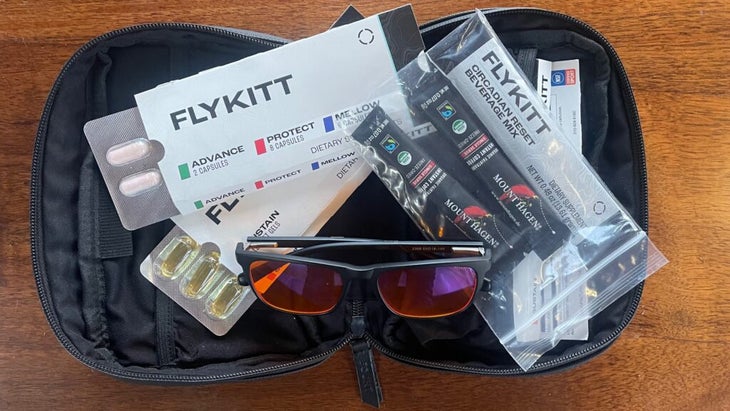
FlyKitt had me taking dietary supplements every few hours, drinking caffeinated, sugary beverages at specific times, and wearing blue-light-filtering glasses at others. The supplements, grouped in blister packs, have simplified names like “protect” (instead of vitamin C with tart-cherry powder) and “mellow” (instead of magnesium with melatonin). Also key is its app, which queried me about my regular sleep habits and upcoming flights before producing a schedule that told me when to take which pill, when to eat and drink, when to sleep, and when to wear the glasses. The app can detect if flights are delayed and recalculate the schedule instantly.
The regimen began shortly after my alarm went off, when the app told me to eat a high-protein, low-carbohydrate meal and pop two “protect” pills and one “sustain” pill (a mix of omega-3 fatty acids and fish oil). It ended 45 hours and 26 pills later. And because the kit comes with enough supplements and drink mixes for two trips, I’ll follow a similar routine when I fly home.
I’d heard about FlyKitt from an �����ԹϺ��� editor, who thought I’d be a good guinea pig to test its legitimacy, given how much I travel. I was skeptical. Having researched other jet lag remedies before—like fasting and eating a hearty breakfast—I knew most are . Science that light (and avoiding light) and, to a lesser extent, melatonin, are the only things that shift your internal clock.
But in South Africa, feeling great, I’m flabbergasted. FlyKitt’s results are mind-bending. I want to know why it works, when no verified research out there yet supports key parts of it. My curiosity turns into a monthslong quest for answers.
A Brief History of FlyKitt and Jet-Lag Research
FlyKitt is the flagship product of the Los Angeles–based company (which is in the process of rebranding itself as FlyKitt.) A biotech start-up, it has evolved from offering customized coaching and wellness plans for people in high-stress jobs—such as CEOs and national security workers—to developing health and human-performance products.
The company was founded by Andrew Herr, a former researcher for the Pentagon who holds graduate degrees from Georgetown University in health physics, microbiology and immunology, and national-security policy. The company’s chief technology officer, Clayton Kim, studied neuroscience and economics at Brown, where he conducted sleep research in the lab directed by Mary Carskadon, one of the country’s preeminent sleep researchers. According to Herr and Kim, FlyKitt solves jet lag for 93 percent of their customers.
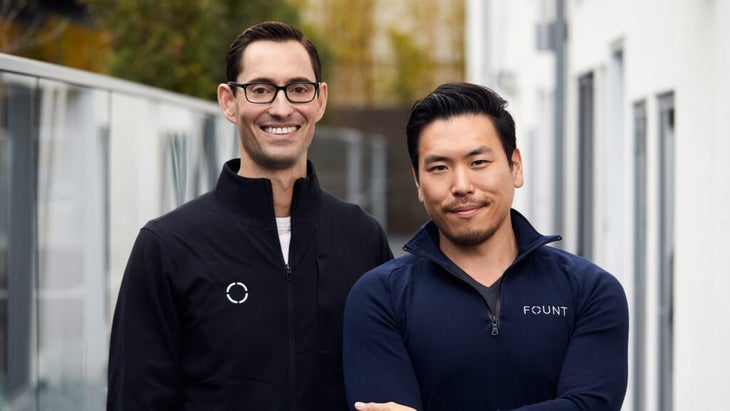
FlyKitt’s work builds upon a considerable body of sleep research that dates back to at least , when scientists at the University of Chicago spent six weeks living in a cave in Kentucky and discovered that humans have internal circadian rhythms. (I once spent 82 hours in total darkness during a cave retreat and my own rhythm fell apart). In 1931, American aviator Wiley Post flew around the world in eight days and described what we now call jet lag, though that term didn’t appear until around 1966 during the golden age of air travel.
“There’s no such thing as ship lag,” says Steven Lockley, a circadian-rhythm scientist, professor, and creator of the app , a FlyKitt competitor that uses tested scientific research and information from peer-reviewed papers to help travelers overcome jet lag by dictating when you should get light and when you should avoid it. I’ve tried Timeshifter multiple times, too, once while jumping 11 time zones between Oregon and Azerbaijan, and had only slight jet-lag-induced wooziness for a day. It is much cheaper than FlyKitt—$25 a year for unlimited trips or $10 for a single trip—but you must begin the regimen of timed light exposure a few days before your trip.
What Is Jet Lag? And How Do Long-Haul Flights Affect the Body?
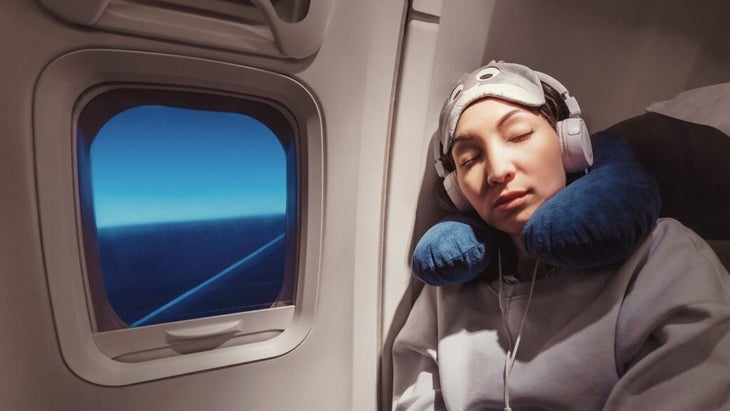
Jet lag is easy to explain. Crossing longitudes quickly leaves our internal clock—otherwise known as our circadian rhythm—and the actual clock at our destination misaligned. What’s extraordinary is how our bodies naturally adapt. This evolutionary gift lets us adjust to seasonal changes in daylight so we can function our best during the day and rest properly at night. Our internal clock is wired to predict how much daylight we’ll have tomorrow, which, eons ago, was crucial to human survival—it ensured we were awake at the right time and rested enough to find a mate, gather food, and avoid being eaten.
Since we’ve only evolved to shift our body clocks by a few minutes each day, however, travel throws that bodily forecast off, and we suffer from jet lag. It’s a delicate system, so delicate that you don’t actually have to travel to throw a wrench into the works. Monday doesn’t suck just because it’s Monday; if you stay out too late on Friday and wake up too late on Saturday, you can suffer from “social jet lag” come Monday morning, even if you slept well on Sunday and were never hungover. Lockley calls that type of non-traveling jet lag “wobble.”
Circadian systems run roughly on 24-hour cycles, but each person is different. People who have shorter circadian rhythms tend to be early birds and generally have an easier time traveling east. People with longer circadian rhythms tend to be night owls and have an easier time traveling west.
Destinations Newsletter
Looking for more great travel intel?Circadian “rhythm” is misleading, because it’s actually many rhythms. Our lungs, heart, kidneys, immune system, digestive system, brain, skin, and likely every cell have their own cycles of productivity and rest. That’s one reason why in the morning and why people who and spend long periods of time “desynchronized” tend to be at a , , and . Our bodies simply don’t function as well when our internal clocks aren’t in sync with the ones on our wrists. One study suggested that the only organ possibly exempt from this cycle is the testicle. (The boys must always be ready.)
Each organ’s “peripheral clock” follows one central clock, a collection of cells in your brain’s hypothalamus called the suprachiasmatic nucleus. “Think of the SCN as the conductor of an orchestra,” Lockley says, “and the peripheral clocks as the players.” The SCN takes its cues from retina cells that contain a special pigment called melanopsin, which can sense changes in light, especially cyan—a key color in daylight and the reason why staring at the blue light emitting from your phone before bed can affect your sleep.
To shift your central internal clock and beat jet lag, then, all of your clocks must shift, a process that takes about one day per hour of time change. A light-dark cycle registered through your eyes is key to making that shift. You can speed that process up by manipulating that cycle and using melatonin. Says Lockley: “That’s the only thing to have ever been shown to shift the clock.”
The FlyKitt Solution to Jet Lag
None of this was new to Herr. “Whenever you look at performance in the military, the circadian rhythm is huge,” he told me. “Soldiers don’t get a lot of sleep, and they need to perform well at night.”
His research went deeper than that. During his years working with the military, Herr sought ways to help SEALs endure extreme conditions—like riding for hours underwater in exposed submersibles—and emerge ready to fight. He also worked with fighter pilots who felt inexplicably foggy after flying at high elevations. Both led him to understand how changes in pressure and available oxygen levels were causing inflammation throughout the body that hindered performance.
Herr’s knowledge came into play later, after founding Fount as a high-end coaching and supplement service. One of his clients, a senior executive, was flying from Washington, D.C., to Seoul to close a business deal, and the South Koreans seemed to have purposely scheduled meetings for a day and time when the executive would be struggling with jet lag. “They were using jet lag as a negotiating tool,” Herr says. The client asked Herr if there was anything he could do to help him feel rested enough to keep from getting crushed.
Herr had a hunch. What if beating jet lag wasn’t just a circadian-rhythm problem but also an inflammation problem? He knew that commercial airlines don’t pressurize cabins to sea level—it’s too costly and stresses the hull—but to 5,000 to 8,000 feet. For a person living in New York or Los Angeles, take-off is like being transported instantly to the elevation of Santa Fe, New Mexico, at 7,200 feet, where each breath yields about 16 percent less oxygen. “Depressurization is stressful on your body,” says Kim.
People who have shorter circadian rhythms tend to be early birds and generally have an easier time traveling east. People with longer circadian rhythms tend to be night owls and have an easier time traveling west.
So Herr created a new plan. He delineated when and what the executive should eat, and how and when he should manage light by using blue-light-filtering glasses. He also gave his client supplements tailored to tackle inflammation specific to flying. Herr incorporated compounds like tart-cherry powder, vitamin C, and omega-3 fatty acids, as well as methylated B vitamins to help boost energy and aid neurological functions. He included small doses of melatonin, to offer the body’s peripheral clocks time cues (called zeitgebers) on whether it was day or night. He asked the client to eat small, protein-rich meals to manage fuel for the brain and to consume caffeine with 13.5 grams of sugar at specified times to create managed spikes in insulin that served as more zeitgebers.
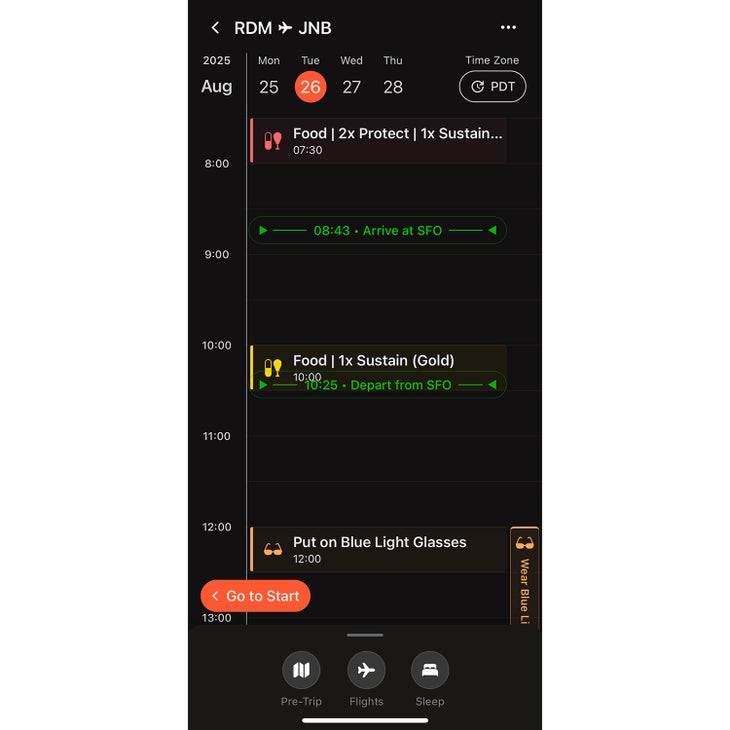
Herr thought, If I could just tamp down the inflammation, tweak the central clock, and wrap it all up in a light-dark routine with enough napping, this client might arrive in South Korea able to function well but also sleepy enough at the right time to get a good night’s rest. He could wake up and have his meeting with little to no issues.
It worked. The client emailed Herr the next day and said, “I slept all night, I feel fantastic! What the hell did you give me?”
Over the next five years or so, Herr fine-tuned the regimen, bringing Kim on to create an algorithm and eventually teaming up with a supplement manufacturer to craft custom supplements at scale. The overarching idea has remained the same. “Other methods require you to sort of ‘prepay’ and begin shifting your clock days before you leave,” Kim says. “We wanted to create something that you could do entirely while you’re in transit.”
Why I’m Convinced FlyKitt Is Legit
Fount has raised $14 million in venture-backed capital. And dozens of Olympians and professional sports teams have used FlyKitt, including the U.S. national men’s soccer squad during the last World Cup, Herr says. Even so, looking over the supplements before my departure, I wondered how safe the whole system might be. For my trip to South Africa, FlyKitt had me taking more than 800 times the recommended daily allowance of vitamin B12—a move designed, in part, to provide energy and prevent sleep. Curious, I reached out to two doctor friends, both of whom told me that the amount raised no red flags, assuming I didn’t consume that quantity every day. Doctors often prescribe that much vitamin B to people with malabsorption issues, one told me.
Dr. Stephan Pasiakos, director of the National Institutes of Health’s Office of Dietary Supplements, also wasn’t worried about FlyKitt’s cocktail of pills. “While not commenting on the product per se, and assuming none of the ingredients mentioned exceed recommended intakes, there are no health concerns in taking these together over a relatively short period of time for healthy adults,” he wrote me via email.
FlyKitt has never undergone a clinical trial, but Herr hopes the military will fund one before too long. He also acknowledges that the link between jet lag and inflammation is a “new discovery” that existing science does not yet back. “But I can rebuke that science with results, which is science,” he says, adding that FlyKitt’s results are based on thousands of test cases. “It’s possible we are right for the wrong reason but we are, nonetheless, right.” The company also offers a money-back guarantee. “We do not get taken up on that very often.”
Late on my second day in South Africa, I begin to feel jet lag’s familiar wooziness seep into my head after returning from a short hike. But the symptom disappears as fast as it came on, after about 15 minutes. Following my return trip to Oregon, I experienced no jet lag at all. Still suspicious, I tried FlyKitt on a third trip, this one with 21 hours of travel, also across nine time zones, to Norway. Once again, zero jet lag.
On that return trip, I decide not to use FlyKitt. Huge mistake. I’m crushed for days—foggy-headed, cold, and so sleepy that I struggle to keep my eyes open until 6:45 P.M., only to awake at 2 A.M. A week later, I’m mostly back to normal. I run all of this by Lockley, who is a competitor, yes, but also impeccably qualified to weigh in. He’s unconvinced FlyKitt is a viable solution for jet lag. “Maybe you got lucky,” he says. “Maybe your flights were timed just right for avoiding light and dark. Placebo is also a thing.”
Without a clinical trial, Herr himself can’t be entirely sure why it works, but he’s certain that it does.
“Occasionally, I ask myself, Did we really solve jet lag?” he says. “But then I look at the results and can’t help but conclude that we did for the vast majority of people.”
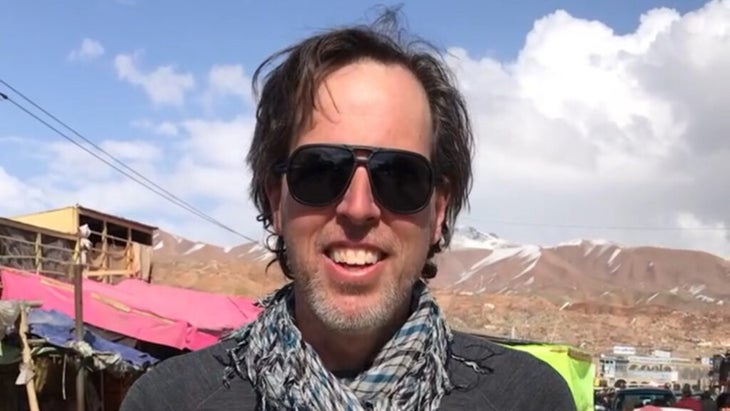
Contributing editor Tim Neville is a night owl who can fall asleep almost anywhere at any time. In fact, he can’t remember the last time he was awake for take-off. He recently wrote an Outside story about the best travel hacks�����Ի� a feature about the world’s most traveled people.


